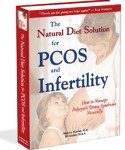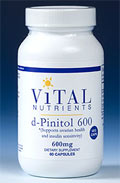PCOS Review Newsletter #122
1) Natural Secret to Ovarian Health
2) Treatment of Ovarian Cysts with Chinese Herbs
3) Review Your Life's Progress
1) Natural Secret to Ovarian Health
You won't hear this from your doctor, but exciting new research is revealing that plant pigments may improve the health of your ovaries and help normalize their function.
If you're not eating your veggies, this article should give you a compelling reason to get started!
Many plant foods are high in red, yellow and orange pigments called "carotenoids". They are especially abundant in yellow-orange vegetables and fruits, and dark green, leafy vegetables. Of the more than 700 naturally occurring carotenoids identified thus far, as many as 50 may be absorbed and metabolized by the human body.
Carotenoids provide antioxidant protection, improve cell-to-cell communication and support the immune system, in addition to other functions. We'll just mention two of the carotenoids here.
- Beta-carotene: The corpus luteum that appears on the ovary at ovulation contains the highest level of beta-carotene in the body.
- Lutein: Lutein appears to play a role in ovarian function. Originally lutein was isolated from the corpus luteum, hence the name "lutein." The corpus luteum of the ovaries contains high concentrations of lutein as well as other carotenoids.
The role of carotenoids in the ovaries is not entirely known. However, carotenoids appear to protect the ovaries against damage from free radicals, which are unstable elements in your cells. One study has noted that women with more consistent levels of carotenoids were more likely to become pregnant with in-vitro fertilization (IVF) than women who had more varying levels of carotenoids.
Several studies have suggested that a free radical activity may interfere with the corpus luteum's ability to produce steroid hormones such as progesterone. Carotenoids may help to control some of this free radical activity since they are well known as antioxidants.
It's also possible that increased intake of carotenoids may help to increase progesterone production. In a study of dogs at Washington State University, administration of supplemental beta-carotene increased their progesterone levels.
Carotenoids may also be helpful for controlling insulin levels and reducing risk of diabetes. A study by the Centers for Disease Control has shown that people had the highest levels of carotenoids were the least likely to develop diabetes or impaired glucose tolerance (which is a risk for women with PCOS).
Carotenoids also appear to reduce your risk of ovarian cancer.
The available research clearly indicates that optimal levels of dietary carotenoids will contribute to improved ovarian health and function.
Refer to chapters 8.8 and 8.10 of The Natural Diet Solution for PCOS and Infertility ebook for lists of vegetables and fruits that are high in beneficial carotenoids.
We urge you to try for five servings of vegetables every day, especially the ones with colors (pigments). Also, some carotenoid-rich fresh fruit is a good idea.
Your ovaries will thank you! And your PCOS problems should diminish.
2) Treatment of Ovarian Cysts with Chinese Herbs
By Carl Hangee-Bauer, ND, LAc Clinic Director, San Francisco Natural Medicine
I want to share with you a clinical pearl that I have found successful in treating my patients with PCOS.
We all know its essential to view the whole person when treating women with PCOS and address the hormonal and metabolic causes associated with this condition.
Sometimes, however, I have found that specific therapies to address the ovarian cysts themselves can go a long way to promote healthy ovulation and improve the chances of pregnancy for women who have struggled with this problem.
A few years ago I came across a study conducted at the Linyl Prefectural Hospital of TCM (Traditional Chinese Medicine) in China. The researchers studied an herbal recipe called Yang He Tang which translates to Increase Fire and in the west is known as Cinnamon and Rehmannia Combination.
They gave this formula to 26 women who were found to have ovarian cysts by both clinical examination and ultrasound, some measuring up to 10 cm (~3.5 inches). Treatment time ranged from 5 to 36 days.
The results were remarkable. 23 out of the 26 women completely resolved their cysts, resulting in clinical cure. Two improved, meaning the cysts were still present, but smaller, and their symptoms improved. One patient did not respond, and upon further surgery revealed that she did not have an ovarian cyst but a teratoma.
I found myself wondering if the addition of this formula to the comprehensive treatment plan I recommend when treating women with PCOS would be beneficial. I had a few patients who, in addition to managing their PCOS, had the goal of achieving and maintaining a successful pregnancy.
According to Traditional Chinese Medicine, ovarian cysts, including those found in women with PCOS, are considered to be a cold-dampness in the pelvis. This 7-herb formula uses herbs that are warming and drying and have an affinity for the pelvic region.
It made sense to me that this may help women with PCOS address the specific symptom of ovarian cysts, and I began to include it in my protocols. Several women became pregnant within a few months of this treatment.
Since that time, I often use this herb formula for about a month in my PCOS patients who have ovarian cysts and have issues with ovulation and pregnancy. The result: all of these women had healthy pregnancies and delivered healthy babies.
My lesson in this is to treat the whole person, but also it can be very helpful to specifically address signs and symptoms and each person's unique and specific goals. TCM herb formulas give us very specific approaches that are tailored to each persons condition and can be very useful for individualized treatment.
3) Review Your Life's Progress
Here we are again at the end of another year. How has the past year been for you and what do you foresee for the next year?
This is a good time to take stock and reflect upon the positive changes you've made in your life and to acknowledge your progress.
What is the nature of your relationship with yourself? When you have a healthy relationship with yourself, good things will happen in your life.
Here are some questions to ask yourself as you contemplate where you are in your life.
1. What new positive habits have I developed?
2. How well have I learned to manage my mind?
3. What have I done to improve my relationships with others?
4. What positive changes have I made to my home or office?
5. Have I listened to my body and am I taking good care of my body?
6. How well have I learned how to deal with negative situations?
7. Have I been able to stop rushing about and be more in the Present Moment?
8. Do I know what my life priorities are, and are my actions based on those priorities?
As you reflect upon these questions, focus on what's worked for you this past year instead of focusing on what still needs to change in the future.
By acknowledging your progress, you increase your self-esteem and self-trust. This gives you a strong foundation for creating a better year ahead.
Thought for Today: "The more you praise and celebrate your life, the more in life there is to celebrate." -- Oprah Winfrey
Footnotes:
Sources:
Schweigert, FJ et al, Concentrations of carotenoids, retinol and a-tocopherol in plasma and follicular fluid of women undergoing IVF, 2003, Human Reproduction, 18(6):1259-1264
Vega M et al, Functional luteolysis in response to hydrogen peroxide in human luteal cells, J Endocrinol. 1995 Oct;147(1):177-82
Endo T et al, Hydrogen peroxide evokes antisteroidogenic and antigonadotropic actions in human granulosa luteal cells, J Clin Endocrinol Metab. 1993 Feb;76(2):337-42
Weng BC et al, Beta-carotene uptake and changes in ovarian steroids and uterine proteins during the estrous cycle in the canine, J Animal Sci, 2000, 78(5):1284-90
Ford ES et al, Diabetes mellitus and serum carotenoids: findings from the third national health and nutrition examination survey, Am J Epidemiol, 1999, 149:168-176
Arellano-Rodriguez G et al, Short-term intake of beta-carotene-supplemented diets enhances ovarian function and progesterone synthesis in goats, J Anim Physiol Anim Nutr (Berl). 2009 Dec;93(6):710-5
Scolastici C et al, Lycopene activity against chemically induced DNA damage in Chinese hamster ovary cells, Toxicol In Vitro. 2007 Aug;21(5):840-5
Landman MJ et al, Carotenoid depletion and ovarian dysfunction in common bully exposed to a New Zealand pulp mill effluent, Aquat Toxicol. 2008 May 30;87(4):303-9
Zhang M et al, Intake of specific carotenoids and the risk of epithelial ovarian cancer, Br J Nutr. 2007 Jul;98(1):187-93
PCOS Health Review
This free newsletter gives you original and immediately usable information to help you deal with PCOS.
Get the latest research, tips for improving your health, answers to questions, success stories, and more!
Your e-mail address is totally secure. We will never misuse your information.
Enter Your Email Above to Subscribe Today
and Get Your Questions Answered in this Free Special Report!





